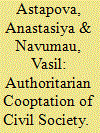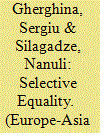| Srl | Item |
| 1 |
ID:
183959


|
|
|
|
|
| Summary/Abstract |
In Belarus, a vibrant civil society coexisted for the better part of the past decade with a firmly entrenched autocracy in a depoliticised cooptation mode. Through cooptation, the energy of civil society was channelled from representing a threat to the regime into being its resource. However, the capacity developed by civil society during this period of political inactivity was quickly redeployed for political purposes at the junction of economic crisis, the regime’s failure to deal with the Covid-19 pandemic and the 2020 presidential election. After the 2020 mass protests, in which civil society played a pivotal role, the regime’s attitude to civil society turned to suppression and hostility.
|
|
|
|
|
|
|
|
|
|
|
|
|
|
|
|
| 2 |
ID:
183964


|
|
|
|
|
| Summary/Abstract |
In December 1994, former US president, Jimmy Carter, travelled to the Bosnian Serb stronghold of Pale outside Sarajevo where he was hosted by rebel leader Radovan Karadžić. Carter negotiated a four-month ceasefire between the Bosnian government and Bosnian Serb forces. This article reconstructs how the Carter mission unfolded, the motivations behind the initiative and how the interests of different actors converged to facilitate the ceasefire. Drawing on the literature on Carter’s post-presidential career, private peace-making and the war in Bosnia, this article uses the case study of the Carter mission to develop the concept of an external private peace entrepreneur. These are private individuals unrelated to a conflict with no official capacity who undertake peace initiatives.
|
|
|
|
|
|
|
|
|
|
|
|
|
|
|
|
| 3 |
ID:
183962


|
|
|
|
|
| Summary/Abstract |
What was behind the Visegrád Group’s (V4) pursuit of its anti-migration policy (2015–2020), despite the adverse effects on the Group’s image and position within the EU? Through the framework of role theory, the article argues that this development stems from the Visegrád Group’s self-created and performed role of ‘sovereigntist’. The objective of this role is to minimise the threat of ‘illegal’ migration as well as to diminish Brussels’ supranational influence, which the V4 perceives as threatening to the particular national identity and sovereignty of its members. The article examines the internal contradictions of this role and how it clashes with the V4’s primary integrational role within the EU structures as a ‘follower’.
|
|
|
|
|
|
|
|
|
|
|
|
|
|
|
|
| 4 |
ID:
183960


|
|
|
|
|
| Summary/Abstract |
This article examines the current memorialisation of the Holocaust in Belarus through the example of the Maly Traścianiec camp, established by the Nazi occupation regime just outside Minsk. It traces the changing interpretations of the site’s history, from neglect of its Holocaust dimension to a partial recognition of this in the past few years and the establishment of two significant memorials, opened in Maly Traścianiec (2015) and Blahaŭščyna Forest (2018). Building on previous studies, it asks whether Belarus may finally recognise the transnational nature of the Holocaust and Maly Traścianiec as a key component of the Holocaust in Belarus. Such recognition may eventually change the government’s longstanding focus on victory in World War II as the founding stone of modern Belarus.
|
|
|
|
|
|
|
|
|
|
|
|
|
|
|
|
| 5 |
ID:
183965


|
|
|
|
|
| Summary/Abstract |
One of the core principles of social democracy is equality between citizens. However, in Europe, several social democratic parties have recently supported referendums against same-sex marriage. This article aims to examine the factors which drove left-wing parties to disregard the principle of equality by comparing the four most recent same-sex marriage referendums—in Croatia, Romania, Slovakia and Slovenia—between 2013 and 2018. The results of the qualitative analysis indicate that this behaviour can be explained by a combination of electoral decisions, government strategies and other ideological components.
|
|
|
|
|
|
|
|
|
|
|
|
|
|
|
|
| 6 |
ID:
183963


|
|
|
|
|
| Summary/Abstract |
This article examines how social capital influences subjective well-being (SWB) in three Central Asian states—Kazakhstan, Kyrgyzstan and Uzbekistan. Based on data from the WVS (Wave 6), it finds that social capital is an important predictor of subjective well-being in the three countries. Trust has a positive impact on SWB in Kyrgyzstan, while social norms are predictors of life satisfaction in Kazakhstan. Finally, social participation has a positive influence on SWB in Kazakhstan and Uzbekistan.
|
|
|
|
|
|
|
|
|
|
|
|
|
|
|
|
| 7 |
ID:
183961


|
|
|
|
|
| Summary/Abstract |
The purpose of this article is to place developments in welfare policy since 2012 in the context of the different models of welfare restructuring in Russia. We focus on President Vladimir Putin’s Decree No. 597, which set out to raise the salaries of doctors, teachers and other categories of public employees. We find that neoliberalism is deeply embedded in policy practice. Furthermore, in order to examine the local effects of national trends in welfare restructuring since 2012, we present a case study of maternity care services in two Russian regions.
|
|
|
|
|
|
|
|
|
|
|
|
|
|
|
|